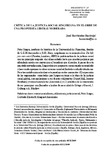Crítica de la justicia social singeriana en el orbe de una propuesta liberal moderada

Date
2010-07-15Auteur
Palabras Clave
Consecuencialismo, Utilitarismo, Justicia socia, Peter Singer, Gertrude Elisabeth Margaret AnscombeConsequentialism, Utilitarianism, Justice
Metadatos
Afficher la notice complèteRésumé
Peter Singer, profesor de bioética de la Universidad de Princeton, deudor de G.E.M Anscombe o R.M. Hare, singulariza en su
reciente obra The life you can save (Picador, Londres, 2009) la problemática de la justicia social con un principio
exigente: dar al necesitado hasta que nuestro perjuicio por ofrendarle ayuda sea mayor que el bene cio que él reciba. A
pesar de esta inusitada reivindicación, Singer ubica su propuesta en un mundo acomodado y hace contemporizar sus ideas con
una sociedad fundada en el individualismo. Nuestra contribución articulará esta paradoja en dos momentos: (1) exposición de
los argumentos concitados por Singer en torno a la ética de la justicia social global, con apelaciones a sus fuentes
utilitaristas (Stuart Mill, Jeremy Bentham) y consecuencialistas (Anscombe) y (2) analítica de la concreción de sus principios con llamadas a la idea de necesidad de Ortega y Gasset, J. Galtung y A. Maslow.
Colecciones
Información Adicional
| Otros Títulos | Critique of sigerian social justice inside of a moderate liberal proposal |
| Correo Electrónico | barrientos@us.es |
| ISSN | 1316-7939 |
| Resumen en otro Idioma | Peter Singer is professor of bioethics at Princeton University, follower of G.E.M. Anscombe and disciple of R.M. Hare. His recent book, The life you can save (Picador, London, 2009), concretes his idea of social justice in the following demanding terms: “we must give until if we gave more, we would be sacrificing something nearly as important as the bad things our donation can prevent”. Despite this strong reivindication, Singer works its proposal inside of a wealthy world; furthermore, its ideas emerge from a society based on individualism. Our contribution aims to articulate this paradoxal issue in two moments: (1) to expound Singer´s arguments on ethical social justice in a global and linked world; this exposition will appeal to his utilitarian (Stuart Mil and Jeremy Bentham) and consequentialism sources (Anscombe); (2) to analyse its principles in a concrete way and to investigate the “necessity” concept in the work of José Ortega y Gasset, J. Galtung and A. Maslow. |
| Colación | 35-57 |
| Publicación Electrónica | Revista Dikaiosyne |
| Sección | Revista Dikaiosyne: Artículos |





